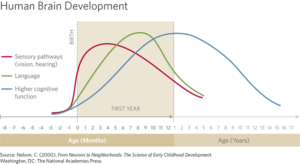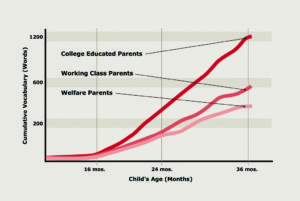When Do Children Learn?
The Early Catastrophe
The 30 Million Word Gap by Age 3
From, American Federation of Teacher Spring 2003
The Importance of Early Years Experiences
We learned from the longitudinal data that the problem of skill differences among children at the time of school entry is bigger, more intractable, and more important than we had thought. So much is happening to children during the first three years at home, at a time they are especially malleable and uniquely dependent on the family for virtually all their experience, that by age 3, an intervention must address not just the lack of knowledge or skill, but an entire general approach to experience.
…..Estimating the hours of intervention needed to equalize children’s early experience makes clear the enormity of the effort that would be required to change children’s lives.”
https://www.aft.org//sites/default/files/periodicals/TheEarlyCatastrophe.pdf
Why is this important?
This research establishes at what age intervention would be most successful by showing ages critical ages when children start learning.
Summary
• Early childhood education can be defined by teaching children between birth and 5 years, (generally the time a child starts kindergarten).
• Research consistently shows learning in the first three years of a child’s life is critical for the future success of the child.
Research
“We all know that how some children arrive at school, will influence how they do for the rest of their academic careers.” Dr. Megan Gunnar, Department Chair, Director of the Institute, Regents Professor, Distinguished McKnight University Professor, Institute of Child Development, University of Minnesota.

“By age two we can already predict third-grade reading scores. So many of the things we think are happening later in life actually had their beginnings in early childhood or infancy.” Dr. Megan Gunnar, Department Chair, Director of the Institute, Regents Professor, Distinguished McKnight University Professor, Institute of Child Development, University of Minnesota
18 Months: Age at Which Disparities in Vocabulary Begin to Appear

Source: Hart, B., & Risley, T. (1995). Meaningful differences in the everyday experiences of young American children. Baltimore, MD: Brookes.
Early experiences and the environments in which children develop in their earliest years can have a lasting impact on later success in school and life. Barriers to children’s educational achievement start early and continue to grow without intervention. Differences in the size of children’s vocabulary first appear at 18 months of age, based on whether they were born into a family with high education and income or low education and income. By age 3, children with college-educated parents or primary caregivers had vocabularies 2 to 3 times larger than those whose parents had not completed high school. By the time these children reach school, they are already behind their peers unless they are engaged in a language-rich environment early in life.
“A great deal of brain architecture is shaped during the first three years after birth, but the window of opportunity for its development does not close on a child’s third birthday.”
(https://developingchild.harvard.edu/)
Brain Development: Conception to Age 3
The first years of life are a vital period for early brain development.